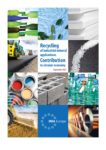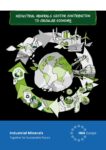Circular Economy
Background
The further development of a circular economy is an ongoing top priority for the European Union and is an integral part of the European Union Industrial Strategy. In March 2020, the European Commission also adopted one of the main building blocks of the Green Deal, a New Circular Economy Action Plan; this new action plan announces initiatives along the entire life cycle of products, from design and manufacturing to consumption, reuse, repair, recycling, and bringing resources back to the economy. This new action also has an international dimension that outlines the EU’s ambition to lead international efforts by strengthening the EU’s partnerships, promoting the circular economy in its free trade, and other multilateral environmental agreements.
Why is it important?
The EU transition to a circular economy will reduce pressure on natural resources and create sustainable growth and new job opportunities. According to the European Commission, applying ambitious circular economy measures in Europe can increase the EU’s GDP by an additional 0.5% by 2030, creating around 700,000 new job opportunities. Transitioning to a circular economy is also crucial to achieving the EU’s 2050 climate neutrality targets and halting biodiversity loss.
Our views
The industrial minerals sector welcomes the EU’s Circular Economic Package, and it is committed to contributing by ensuring the sustainable extraction, production, and use of the invaluable resources they produce or use to contribute to the overall policy objective of the Circular Economy.

